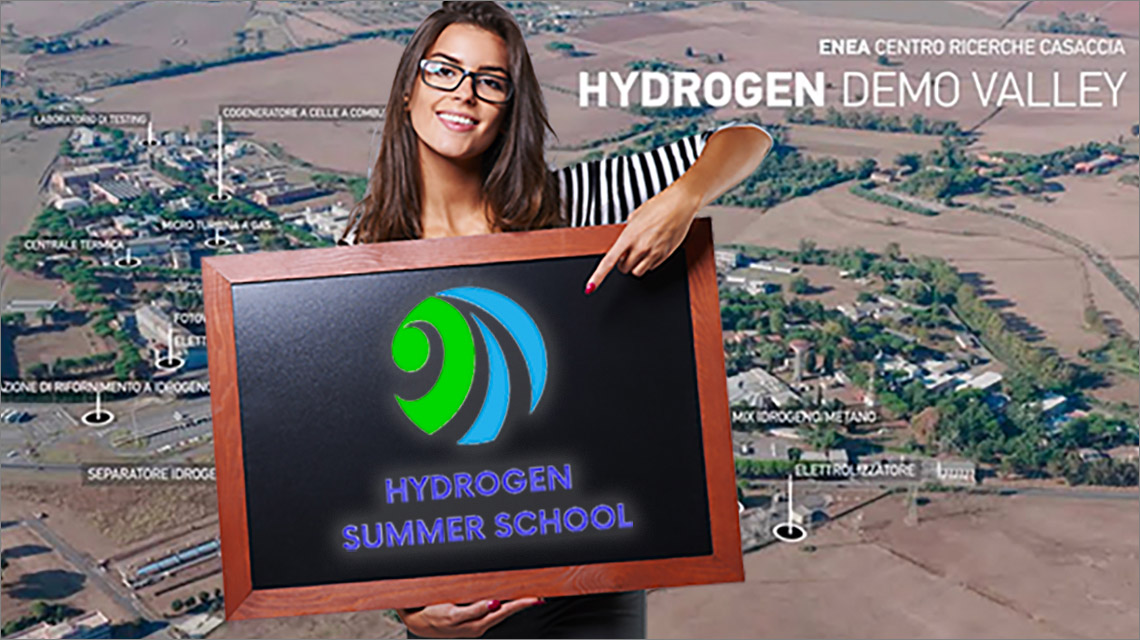Italian National Agency for New Technologies, Energy and Sustainable Economic Development

Energy: ENEA held first summer school at its Casaccia research center
The first edition of the Summer School on hydrogen organized by the ENEA Energy Technologies and Renewable Sources Department together with Sapienza University of Rome and the Italian Association of Chemical Engineering was held from 21 to 23 September. The initiative had the aim of providing PhD students, researchers and young professionals with an overview on technology and a basis for comparison on the challenges to be faced for the development and sustainable integration of hydrogen in the Italian energy system.
The training course, which ended with a test session behind the wheel of a hydrogen vehicle, took place at the ENEA Casaccia Research Center (Rome) as part of the Hydrogen Demo Valley, the hub funded with 14 million euro from the Ministry of Ecological Transition through a program agreement of the initiative Mission Innovation, which hosted various training sessions in the classroom, providing facilities and laboratories where research, technological development, safety and the regulatory and authorization process were addressed.
Thanks to the participation of the main italian research organizations dealing with hydrogen, (including the Cnr, RSE and e Bruno Kessler Foundation), as well as representatives of the national industry in the sector (including Total, Enel, Eni, Alstom, Iveco, Ansaldo, Fincantieri and Toyota), the school offered a complete training program and aims to promote a “culture” of hydrogen to increase its social acceptance.
"It is certain that hydrogen will play a key role in the decarbonisation of the European energy system. We are talking about green hydrogen, produced from renewable energy sources like solar photovoltaics, wind, biomass " said Giorgio Graditi, Head of the ENEA Energy Technologies and Renewable Sources Department "In order to achieve this goal - continued Graditi – we still have to work hard on research, innovation and technology transfer.
“However, we have already reached a good level of awareness and know-how we believe is crucial to share with the entire sector. In order for an economically and socially sustainable energy transition to take place, it is necessary to outline operational plans, but also to provide for accompanying measures and adequate training courses, involving all sectors (energy, industrial, civil, residential, transport) and the entire supply chain from production, distribution and accumulation, up to final users ”, concluded Graditi.
The course was divided into lessons in the classroom, interactive sessions between students and teachers to develop projects, visits to laboratories and plants and, thanks to Toyota Italia, a test ride aboard one of the first hydrogen fuel cell vehicles at the Casaccia Research Center.
ENEA commitment to training in this sector also passes through the periodical dissemination of short videos-"Pills of Hydrogen"- addressed at high school students: a journey to discover this resource that it will bring students closer to an energy sector crucial for decarbonisation. The topics include: how to build a fuel cell, how hydrogen is transported and produced, what do green, blue and gray hydrogen mean, how a hydrogen refueling station is made and much more. Online the first two issues “Che cos’è l’idrogeno?” e “Chi ha scoperto l’idrogeno? Un po' di storia”.
In addition, ENEA provides technical-scientific support to the Ministries of Ecological Transition and Economic Development to achieve the objectives set in the PNRR, Mission Innovation and IPCEI fields. The Agency participates with its own project in the IPCEI Hy2Tech, approved last July by the European Commission, in support of the European hydrogen supply chain through research, innovation and demonstration activities to favor the development and cost reduction of production processes and technologies related to its use in different sectors: industry, transport, civil and residential (the latter in blending with natural gas).
For more information:
For “Pills of Hydrogen” “Che cos’è l’idrogeno?” e “Chi ha scoperto l’idrogeno? Un po' di storia
